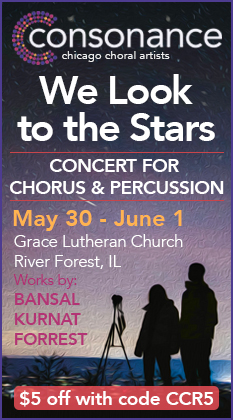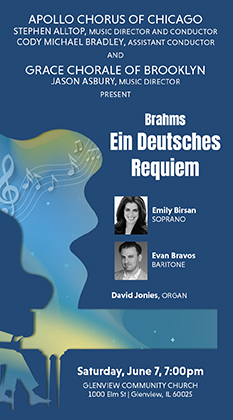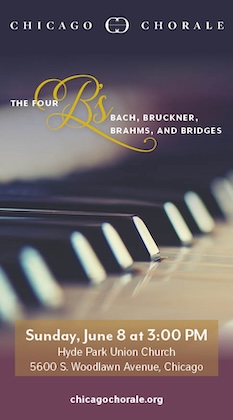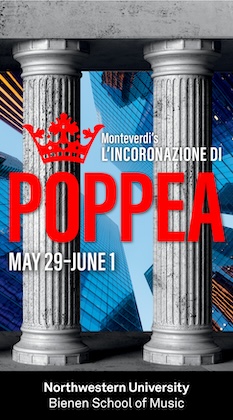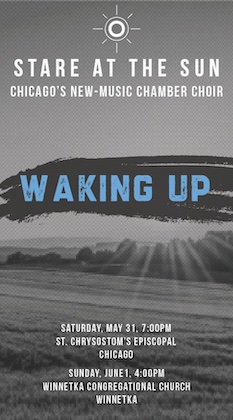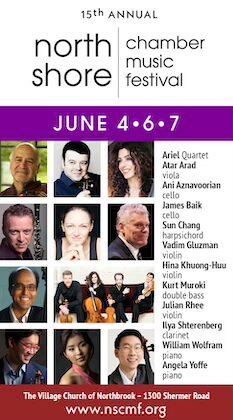North Shore Chamber Fest opens with eruptive Beethoven by Escher Quartet

The North Shore Chamber Music Festival opened its ninth season Wednesday night at Village Presbyterian Church in Northbrook. While the program was not generous in musical duration, the performances offered the same top level of polished and committed music-making that has made this event a welcome harbinger of the summer season for nearly a decade.
The Escher String Quartet led off the evening with Beethoven’s Quartet in F minor, Op. 95. A road marker between the composer’s Op. 59 and 74 and the metaphysical searching of the late quartets, the “Serioso” is the shortest of Beethoven’s sixteen works in the genre but by no means the lightest, with a grim austerity befitting its title.
Members of the Chamber Music Society of Lincoln Center, the Escher Quartet is one of our leading young chamber groups. The ensemble’s blend of eruptive power and burnished refinement are ideal for Beethoven and this particular work. Their swift, seamless alternation of the aggressive unison opening motif and the ensuing lyrical theme set an apt atmosphere of unsettled dislocation.
The group has a warm and inviting corporate sonority, led by the pure, sweet timbre of first violinist Adam Barnett-Hart. Yet the beauty of tone is always put at the service of the music. Accented by the soft yet inexorable quality of cellist Brook Speltz’s ominous descants, the players found a wistful poignance in the Allegretto, with the unhurried tempo and phrasing feeling not only ideal but inevitable. That sense of spacious introspection was sharply contrasted with the stomping accents of the ensuing Allegro assai.
The taut tension of the opening movement returned in the finale with the Escher musicians bringing a restless, driven quality to the agitated main theme. The abrupt turn towards high spirits in the coda was especially well done by the group; while the breakout solos were dazzling in their speed and bravura, the burst of virtuosity was thrown off not with cheerful joy but with a sense of manic desperation that well suited the overall tone of the piece.
Conversely, Schubert’s Octet, which closed the evening, is the Beethoven quartet’s polar opposite—an hour-long work with fleeting moments of darkness but one where an expansive lyricism and relaxed pastoral expression reigns.
Less often heard than most of Schubert’s chamber masterworks due to its large mixed forces, the Octet is ideal for one-off festival outings like this, where one can more easily field a consistently strong group of players.
Such was the case Wednesday night, with a terrific ensemble of mostly festival regulars without a single weak link. They were violinists Vadim Gluzman and Lisa Shihoten, violist Atar Arad, cellist Mark Kosower, bassist Kurt Muroki, clarinetist Ilya Shterenberg, bassoonist Catherine Chen and hornist Eric Reed.
While the Octet provides spotlit moments for all eight players, it offers especially showy opportunities for the first violin and clarinet. Gluzman, festival artistic director, brought characteristic polish and whirlwind virtuosity to the fore while winnowing his gleaming tone down to collegial chamber dimensions and underlining the score’s folk-like qualities.
Shterenberg was first among equals in this performance. The clarinetist was superb throughout—bringing a noble simplicity to the Adagio’s opening solo, brilliance to the finale’s virtuosic runs, and delightfully embodying the village wind band rusticity, with an especially jaunty touch in the third movement.
That kind of open-air spontaneity was manifest throughout this personality-plus performance with all the players displaying individual joi de vivre while maintaining ensemble cohesion. Highlights included the conversational give-and-take of the opening movement, the charming lilt given to the main theme of the variations—tender and bumptious by turn—and the buoyant grace in the finale’s galumphing main theme.
The one debit on the performance was that the darker passages of the Octet were given rather short shrift. The sinister tremolo that launches the epic journey felt far too casual, and lightweight in sonority, lacking presence from the low instruments. The same went for its repeated appearances, with the motto’s climactic interruption of the sunny finale missing its baleful dramatic impact.
Following intermission the festival awarded their first Community Ambassador Awards awards to three worthy recipients: Henry Fogel, violin teacher Betty Haag-Kuhnke and Aviv Ezra, Israel’s consul general to the Midwest.
Even with mostly brief remarks by the award winners, the amount of speechifying at Wednesday’s event verged on the surreal. Following a welcome from the church pastor, there was a duo introductory speech by festival founders Gluzman and Angela Yoffe (heavy on plugs for supportive local businesses), more comments by an unidentified moderator, verbal program notes by the musicians, and acceptance speeches by the three awardees. In all, nine people were given the microphone during an evening that offered less than 90 minutes of music.
As they approach the decade mark, “The Music Makers” should bear in mind that most audience members are there to hear music, not to listen to people talk.
The North Shore Chamber Music Festival continues through Saturday. Friday night’s program features the Escher Quartet and includes Mozart’s Divertimento in D, K.136, Anton Reicha’s Clarinet Quintet, Dvorak’s “Dumky” piano trio and the world premiere of Atar Arad’s From Here to There. Concert time is 7:30 p.m. at Village Presbyterian Church in Northbrook. nscmf.org
Posted in Performances
